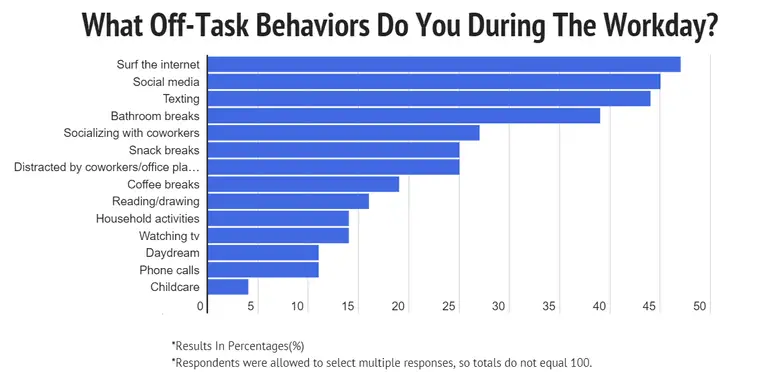Have you ever checked your Instagram feed mindlessly or shopped for new gadgets while at work? You probably have, and this is something known as cyberloafing.
As innocent as it may seem, cyberloafing is one of the most counterproductive work behaviors and can cause serious issues for employers. Today, we’ll show you everything you need to know about this behavior - what it is and how to prevent it.
We've all been there, but what you may not realize is that this behavior, known as cyberloafing, can actually cost a company big time.
What Is cyberloafing?
Cyberloafing is the term used to describe the act of wasting time at work by surfing the internet, shopping online (including Google Shopping scraping), or engaging in other non-work-related activities.

While there is no set definition for cyberloafing, it is generally considered to be any online activity that is not directly related to work and which affects work performance. With internet access at work, employees have endless cyberloafing opportunities.
Cyberloafing is a type of deviant behavior can have a number of negative consequences for both employees and employers.
For employees, cyberloafing can lead to decreased productivity and may even put their job at risk. Employers may suffer from decreased profits and may be forced to invest in security measures to prevent employees from cyberloafing.
While there is no easy solution to cyberloafing, employers can take steps to reduce it in the workplace.
Is cyberloafing ethical?
There is no easy answer to the question of whether or not cyberloafing is ethical.
- On the one hand, it can be seen as a time theft, as employees are essentially stealing time from their employer by goofing off online.
- On the other hand, some people argue that cyberloafing can actually be beneficial, as it can help employees relax and recharge, making them more productive in the long run. Bored employees can very easily become highly productive with the right kind of engagement.
While there are different forms of cyberloafing, it is inherently not beneficial for the employer. The employees are effectively working on activities unrelated to work while being paid an hourly salary. As productive as cyberloafing can be for some employees, employers should aim to minimize it and work on coping mechanism to improve job satisfaction.
How long do employees spend on cyberloafing?
Cyberloafing has become a growing problem in the workplace, as more and more employees spend time surfing the internet, shopping online, or engaging in other personal activities during work hours, beyond their break times.
survey of 3,200 Americans pegs their average loss per day due to non-work related online activity at over two hours and on the high side costs bosses $4,500 annually per employee. The actual behavior could be costing you hundreds of thousands of dollars per year.
While those numbers may not appear dramatic, they understate damages because cyberloafing is particularly disruptive of network performance in a busy office and can also lead to lost productivity as employees struggle with slower connections and system crashes.
Another study of 1,000 workers found that the average employee spends nearly two hours each workday engaged in these counterproductive work behaviors.
The findings suggest that cyberloafing is a significant problem in the workplace and that employers need to take steps to address these types of actions of employees.
In addition, the study highlights the importance of monitoring employee internet use and implementing policies to limit personal use of work devices.
How much does cyberloafing cost companies?
There are a number of reasons why employees engage in cyberloafing.
- In some cases, it may be due to simple boredom or a case of ‘work underloaded'.
- In other cases, it may be a way to procrastinate or avoid a heavy employee workload.
Whatever the reason, cyberloafing is a serious problem for businesses.
Cyberloafing can cost companies a lot of money in lost productivity. It is estimated that employees who engage in different forms of cyberloafing spend an average of 2.5 hours per week on personal activities such as shopping, checking personal email, or playing games.
This can add up to a significant cost for companies, especially if they have a large workforce. In addition, cyberloafing can lead to security risks for companies if employees access sensitive information or download harmful software.
According to a report from the American Management Association, the average cost of lost productivity due to internet surfing at work is $588 per year per employee. That means for a company with 1,000 employees, cyberloafing could cost them almost $600,000 per year!
There are a few ways to combat different types of cyberloafing in work-based settings.
- First, businesses can create a policy that prohibits personal internet use during work hours. For example, they can introduce time tracking so that each minute of employees’ time is accounted for.
- Second, businesses can monitor employee internet usage and block sites that are not work-related.
- Finally, businesses can provide employees with more interesting and engaging work to do.
Can you face disciplinary actions because of cyberloafing in the workplace?
For employees, cyberloafing can lead to decreased productivity and may even get them into trouble with their bosses. In some cases, it can even lead to disciplinary action or termination.
For employers, cyberloafing can lead to lost productivity and decreased morale in work-based settings. It can also put the company at risk if sensitive information is accessed or shared without proper security measures in place.
Cyberloafing can also lead to disciplinary action from employers.
- Employers may view cyberloafing as a form of theft, as the employee is essentially stealing time from the company.
- As smartphone and tablet sales have increased, companies have noticed that some employees might be abusing their device ownership with the ability to access unregulated Internet use at will during business hours.
- It is not a practically viable strategy, however, to track an employee on his or her personal Internet-enabled device since it would amount to an illegal invasion of privacy and can get costly to try and keep up with.
- In such cases, it is left to team leaders to use their skills of persuasion to control cyberloafing and increase work performance.
- While it may be tempting to kill time by checking Facebook or reading the latest news, employees would do well to understand that they are being paid to work, not surf the web. If caught cyberloafing, they could face disciplinary action that could jeopardize their jobs.
Cyberloafing is a serious problem for businesses, but there are ways to combat it. By creating a policy that prohibits personal internet use, monitoring employee internet usage and providing employees with more interesting work, businesses can reduce the amount of cyberloafing that takes place in the workplace.
Whatever method a company chooses, it's important to try to reduce this amount of uncontrolled cyberloafing that takes place. Not only will it save the company money, but it will also make employees more productive and efficient.
Wrapping up
Cyberloafing is a type of counterproductive behavior that hurts everyone. The employer, the employee, and eventually the customers of a business. Luckily, there is one easy fix in your workplace settings that can make a massive difference in minimizing cyberloafing.
Start tracking your employees’ time today and find out what they really do and where their time goes at work. With Unrubble, you can easily track time for in-office, remote or hybrid employees. At a glance, you can see what everyone is up to at any point in time.
Sign up for your free trial today!
Frequently asked questions
What is an example of cyberloafing?
There are different types of cyberloafing. However, any activity that is not work but is being done in work-based settings - is cyberloafing. For example, checking your personal emails, shopping, browsing social media or anything along those lines. While there are individual differences in what bored employees do to pass the time at work, there is one thing in common - it’s time wasted for the employer.
Is cyberloafing good or bad?
It depends on the employee and employer. It’s not necessarily deviant behavior and can actually be beneficial if it’s in smaller amounts. With widespread internet usage, avoiding different forms of cyberloafing has become very difficult. However, in healthy amounts, cyberloafing can positively affect the employee workload and productivity.
Is cyberloafing unethical?
Most definitely, as the employee is doing something else while they are on the clock and getting paid to do their work. It’s a counterproductive behavior that harms the employer and their bottom line so yes, it is unethical.Taneja et al stressors-inhibition hypothesis
What is the difference between cyberslacking and cyberloafing?
Cyberslacking and cyberloafing both refer to using electronic devices for personal activities during work hours, but cyberslacking often emphasizes leisure, like streaming videos, whereas cyberloafing frequently involves social network sites and other non-work online activities.
What is a cyber loafer?
A cyber loafer is an employee who engages in cyberloafing behaviors, using work time to access social media platforms or other personal internet activities instead of performing job tasks.
How much does cyberloafing cost?
Future research is needed to quantify the exact cost, but early research indicates that cyberloafing can significantly impact job performance, leading to substantial productivity losses in the workplace.
What causes cyberloafing?
Causes of cyberloafing include workplace boredom, job stress, and negative emotions. Employees often use it as a coping mechanism to momentarily escape the pressures of their job tasks.
What is prime cyberloafing?
An example of cyberloafing includes an employee spending a considerable part of their workday on social media sites or browsing unrelated content online instead of focusing on job tasks.
Why is cyberloafing bad for business?
Cyberloafing is bad for business as it is a counterproductive work behavior that can reduce employee engagement, lower productivity, and negatively impact the overall job performance of the workforce.
What are the problems with cyberloafing?
Problems with cyberloafing include reduced job satisfaction, diminished employee engagement, and a decrease in productivity as employees focus more on personal online activities than on job performance.
What are the cons of cyberloafing?
The cons of cyberloafing involve a decline in performing job tasks efficiently, possible security risks from accessing non-work-related sites on company devices, and the potential for fostering a work environment that negatively impacts employee morale and productivity.








